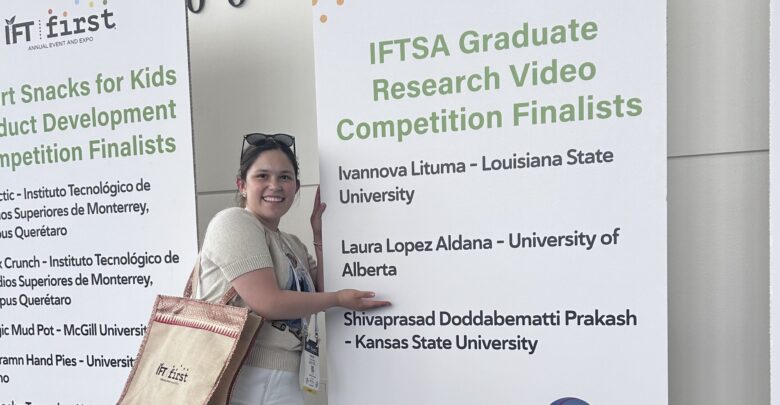 Supplied
SuppliedOn July 17, University of Alberta graduate student Laura López Aldana was named as a finalist in a food research competition hosted by the Institute of Food Technologists Student Association (IFTSA).
The graduate research video competition was held from July 14 – 17 in Chicago, Illinois. To compete, students submitted a three-minute video relating to research conducted during their graduate studies. The videos could centre on any subject related to food science or technology.
“When I submitted it, I wasn’t expecting to be a finalist because IFT itself is such a big organization and it has schools from all over the world. Once I got the chance to be there in Chicago at the conference, it was almost overwhelming,” López said.
López is currently doing a Master’s in Food Science and Technology. Her research pertains to the enhancement of 3D printed foods to improve swallowing and visual appeal for individuals with dysphagia. The video that she submitted for the competition also focused on this concept.
Dysphagia is a medical condition that results in difficulty swallowing for affected individuals. Approximately 20 per cent of the global population is affected by this condition, López said.
New flavour compounds for 3D printed food could improve swallowing
According to López, food for individuals with dysphagia is typically “not very appealing.” Additionally, this food needs to be of a very specific texture.
“If the food doesn’t meet those texture requirements, it could cause individuals to choke [or] it could cause them to aspirate,” López said.
“I’m using 3D food printing to make this food look better and more appealing, [and to] make individuals want to consume it more.”
López is also researching how different flavour compounds could enhance swallowing for individuals with dysphagia.
“Things such as sourness and umami have been shown to enhance swallowing. I’m using those different compounds and looking at what concentrations and types of things could help with swallowing in general,” López said.
“People with dysphagia are isolated from their community,” López says
In addition to choking, dysphagia can lead to more serious problems such as infections if left untreated, according to López. However, dysphagia does not only lead to physical issues.
“Lots of people with dysphagia are isolated from their community and even their families because their food looks different. So then they don’t want to eat it, which causes malnutrition. Then [also] depression because their food looks unappealing.”
Dysphagia predominantly affects individuals over the age of 65, López said. Additionally, dysphagia also affects individuals with cancer, Alzheimer’s, and Parkinson’s disease.
“Considering [that] the global population is an aging population, [this research] is very important because we start to see more and more individuals being affected,” López said.
López is currently working on conducting trials to move forward with this research. “Hopefully the next steps will be to [do] the trials and eventually publish what the results are,” she said.




